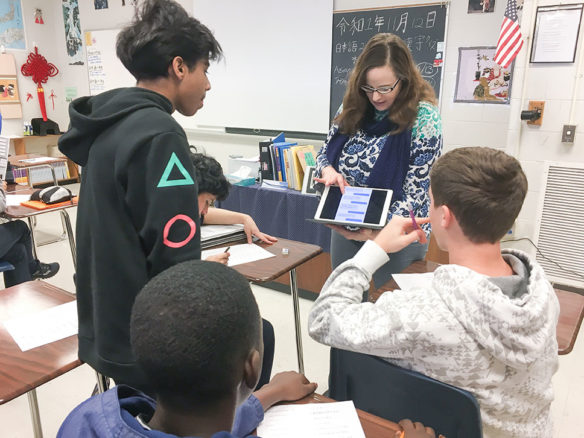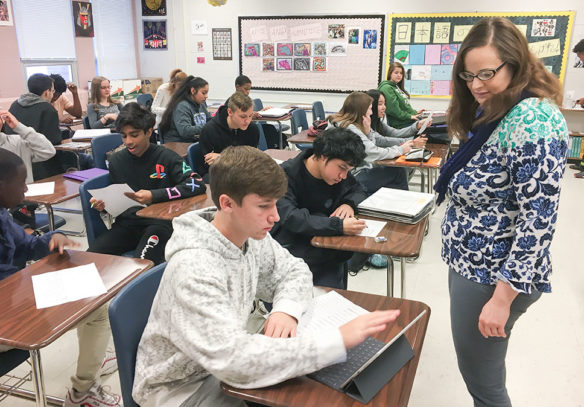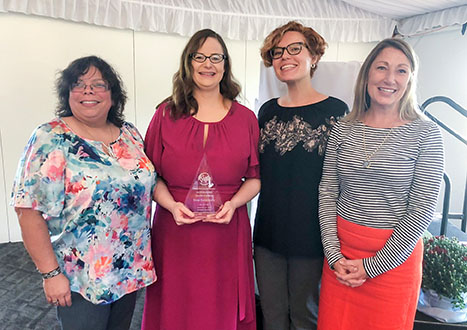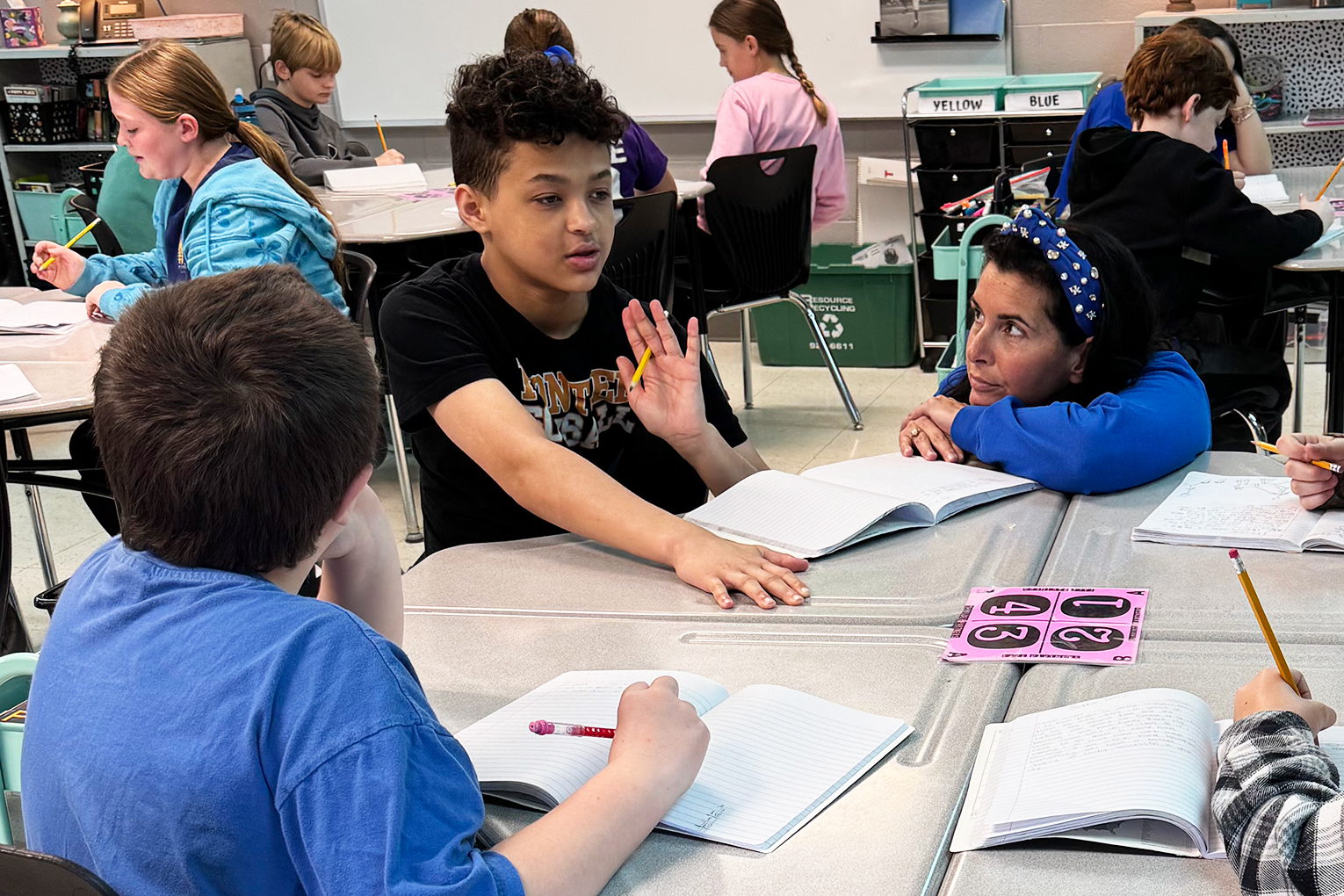
Elena Kamenetzky, center, a Japanese teacher at Eastern High School (Jefferson County), was named the 2020 Southern Conference on Language Teaching teacher of the year. She was selected based on her excellent teaching, her strong contributions to world languages, her letters of recommendation and an interview.
Photo submitted by Jefferson County Public Schools
- Elena Kamenetzky, a Japanese teacher at Eastern High School (Jefferson County), was recently named the 2020 SCOLT teacher of the year.
- According to Kamenetzky, the positive attitude of her students during this time of uncertainty has begun to rub off on her – something for which she is very thankful.
By Jacob Perkins
Jacob.perkins@education.ky.gov
Throughout her life, language has been an outlet for Elena Kamenetzky.
Now the 2020 Southern Conference on Language Teaching (SCOLT) Teacher of the Year award-winner is hoping to show her students that they too can use language as a way to cope with struggles they may be facing in their lives.
“I’ve struggled with anxiety and mental health issues all my life,” she explained. “But it was taking Spanish and Japanese classes in high school that really helped me improve my social skills and learn how to build better relationships.”
Kamenetzky, a Japanese teacher at Eastern High School (Jefferson County), was named the 2020 SCOLT teacher of the year. She was selected based on her excellent teaching, her strong contributions to world languages, her letters of recommendation and an interview. She will advance to the national competition sponsored by the American Council on the Teaching of Foreign Language (ACTFL).
During the ACTFL convention in San Antonio in November, Kamenetzky and four other regional teachers will vie for the title of ACTFL National Language Teacher of the Year. The selected teacher will serve as the national spokesperson for language learning in 2021.
“I’m honestly still floored that I won,” said Kamenetzky. “The other Teacher of the Year candidates were all amazing, accomplished, incredible teachers.”
Kamenetzky hopes to use this award as an opportunity to speak about how important world language instruction is for Kentucky’s students.
“Japanese was the first class that was truly difficult for me, and it taught me a lot about how to deal with setbacks without having a nervous breakdown,” she said.
She sees her students today having that same battle – not just with the language, but also with mental health.
“I know that a lot of my students are struggling with anxiety, depression and other mental health issues,” she said. “But I’ve also seen many of those same students find confidence and belonging in the language classroom.”

Elena Kamenetzky, right, checks on the work of one of her students at Eastern High School (Jefferson County). Kamenetzky hopes to use the 2020 SCOLT teacher of the year award as an opportunity to speak about how important world language instruction is for Kentucky’s students.
Photo submitted by Jefferson County Public Schools
That language classroom that brought out the confidence and provided a sense of belonging to Kamenetzky’s students now sits vacant, along with all of the other classrooms across the state. However, just because the school buildings are closed doesn’t mean learning stops. Instruction continues – but in a non-traditional manner.
As a way to control the spread of the 2019 novel coronavirus, all 172 Kentucky school districts, 53 area technology centers, Kentucky School for the Blind and Kentucky School for the Deaf ceased in-person classes and began instituting non-traditional instruction (NTI) in response to a March 16 recommendation made by Gov. Andy Beshear.
Some districts, including Jefferson County Public Schools, weren’t already a part of the NTI program. Therefore, the district had to develop an NTI plan and get it approved by the Kentucky Board of Education before they could start implementing instruction.
Kamenetzky used this as an opportunity for her students to finally use their skills outside of the classroom.
“What’s ironic is that I’m always pushing my students to practice their language more outside the classroom, and now, they have to,” she said.
Kamenetzky set up a Google Hangout for her Japanese language classes on the district’s first day of NTI. She was pleasantly surprised to see how quickly her students jumped into the instruction – even teaching her some new things.
“The students were immediately sharing conversation apps that they could use to connect with native speakers. Some of them I had heard of before, but some of them were new to me,” said Kamenetzky.
Another way she has engaged her students during NTI is through webquests – a lesson format in which most or all of the information comes from the internet.
“For world language instruction it has to be very targeted,” Kamenetzky explained. “Send the students to a website in the target language, show them how to use the search function, ask them to search for something specific, make them answer some questions and ask them to share something with the rest of the class.”

Catherine del Valle, Spanish teacher at Russell High School (Russell Independent), from left, Elena Kamenetzky, Japanese teacher at Eastern High School (Jefferson County), Brenna Byrd, German professor at the University of Kentucky and Fayette County Public Schools World Language Coordinator Laura Roche pose for a photo at Kamenetzky’s regional award ceremony.
Photo submitted
This was task that her students have already grown accustomed to because they are used to doing them when in-person classes are in session.
“I’ve found that this type of activity is good for students because it lets them access authentic material in the target language, but the only technology it requires them to have is a good old-fashioned web browser,” said Kamenetzky.
According to Kamenetzky, the positive attitude of her students during this time of uncertainty has begun to rub off on her – something for which she is very thankful.
“Seeing their willingness to try new things, their patience when dealing with me figuring out new technology, and their ability to laugh when things go wrong has helped me stay positive instead of feeling overwhelmed,” she said. “My students are really the ones who are getting me through this, and I’m incredibly grateful to them.”
Before coming to teach Japanese at Eastern High School in 2010, Kamenetzky was an assistant teacher of English at two middle schools as part of the JET Program in Achi Village, Japan, from 2006 to 2009.




Leave A Comment